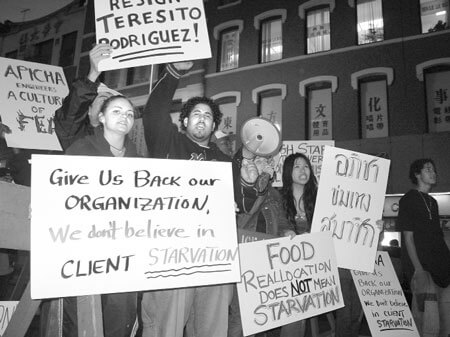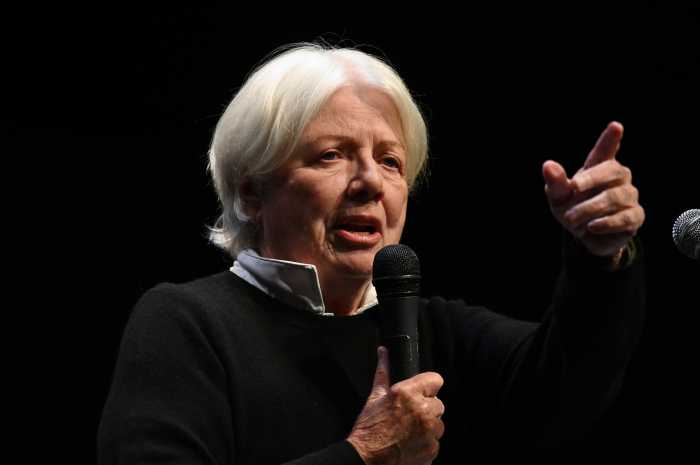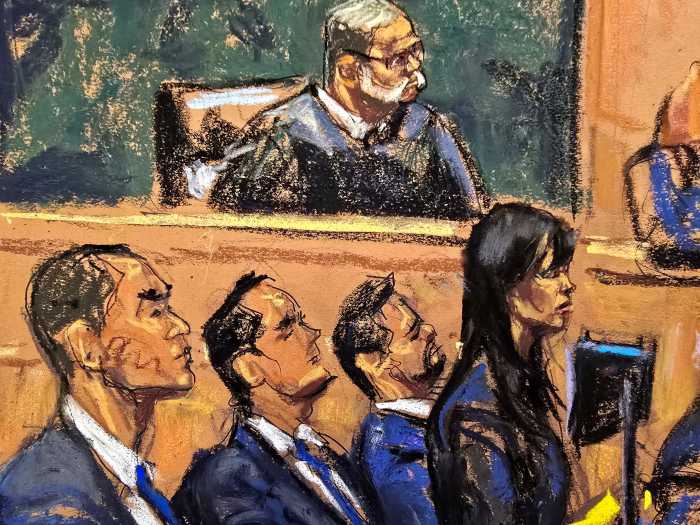Non-binding mediation results from hearing on AIDS group’s suit against former clients
The Asian and Pacific Islander Coalition on HIV-AIDS (APICHA) and a protest group of former and current clients, former staffers, and their supporters have entered into “non-binding mediation” in an effort to end a years-long fight that resulted in APICHA suing the others earlier this year.
“Sometimes there are issues that go beyond the attorneys,” said Judge Carol Edmead, a state Supreme Court justice, at a March 23 hearing. “It is in the best interests of the population that you want to serve that you get together and resolve your dispute.”
Edmead called the parties to her courtroom where she first met privately with attorneys for both sides, representatives from the AIDS agency, and members of the ad hoc committee, the protest group that has objected to operations at the agency.
Later, in open court, Edmead kept in place a January 16 injunction that banned the ad hoc committee from mounting demonstrations in APICHA’s Chinatown office or from contacting any agency employees.
The committee must also give Edmead all copies of a videotape the group made during an August 2003 protest at APICHA’s office as well as any still photographs that may have been taken then. Agency staff have expressed concern that the confidentiality of some clients may have been violated if their picture was taken.
APICHA also sought $500,000 to compensate for damages it claimed resulted from three 2003 protests, but there was no public discussion of that money on March 23. Some of the ad hoc committee members are living with AIDS and on disability and Kevin Huang-Cruz, chair of APICHA’s board and a client at the agency, said, in a March 12 interview, “There is no expectation that we are going to get” the cash.
The mediation must begin within 30 days with each side sending three representatives to meet with an arbitrator. That group will set its own agenda and, after 15 hours of meetings, the arbitrator will submit a report to Edmead. The group may continue meeting after that or Edmead may issue a ruling in the case then. Ideally, the arbitration group will end the fight.
“The alternative to this is, for about 18 months, you will be in and out of court, you’ll be taking depositions, I’ll be making rulings,” Edmead said.
While the mediation is non-binding, a court reporter will transcribe the arbitration proceedings and Edmead will use that record in any later ruling she issues.
While APICHA sought only the injunction, the pictures, and the $500,000 in its lawsuit, Huang-Cruz said he welcomed the outcome of the hearing.
“We’re pleased with the result,” he said. “We’re very happy with the result and we’re very committed to the mediation process.”
While Edmead said the parties had agreed to mediation, Huang-Cruz said they had been ordered into it. John Hayakawa Torok, also an APICHA board member, said that if Edmead had limited her ruling to the injunction and the photos that would have been better.
“If she had done just that we would have been happier,” he said.
In court, Don Kao, an ad hoc committee member and a former APICHA board member, said he was excited at the prospect of a mediation though he was more cautious in a later interview.
“My only concern has been that mediation is what we have been wanting over the past two years, but as good as what we can expect to get out of this, there is still no guarantee that APICHA is committed to changing things,” he said. “I’m excited to a certain extent… Whatever comes out of a mediation it’s not binding. They can change their minds.”
Some of the former APICHA clients were heartened by the proceeding, according to Kao.
“I think they were also incredibly pleased with the judge,” he said. “I think they felt that we made some real gains here. I don’t know that they feel convinced that APICHA is going to get better right away, but I think they feel hopeful.”
While the dispute dates back to the 1990s, the ad hoc committee members began complaining about service at APICHA in earnest in 2001 and 2002, according to Kao. Relations grew worse in 2003.
The ad hoc committee charged that a number of program changes, such as placing time limits on participation in a food program, ending a client support group, and shutting down a client advisory board were retaliation for their complaints.
APICHA said those changes were required by funders or were standard practice at AIDS groups.


































